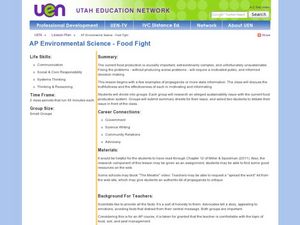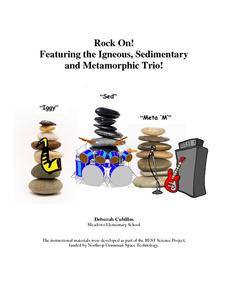Cal Recycle
Conserving Natural Resources
Trying to plan an engaging elementary science unit on natural resources? Conserve your energy! This five-part series of lessons and hands-on activities has exactly what you need to teach young scholars about the importance of conservation.
Howard Hughes Medical Institute
The Making of the Fittest: Natural Selection in Humans
Sickle cell disease only occurs when both parents contribute the trait, and mostly in those of African descent. Where did it come from? How did it evolve? Tony Allison, a molecular biologist, noticed a connection between sickle cell and...
Berkshire Museum
Nature Journaling: Experience the Outdoors Through Writing and Drawing
Step into the great outdoors and develop young scientists' skills of observation with a nature journaling lesson. Given a specific focus or goal, children practice making and recording observations of nature through written descriptions...
Howard Hughes Medical Institute
Natural Selection and the Evolution of Darwin's Finches
Darwin explained the connection between species of finches 150 years before scientists understood DNA. Technology and progressing science proved he was right, yet many struggle to understand how natural selection happens. Scholars use...
National Science Teacher Association
Middle School Sampler: Science
Focus on inquiry-based learning in your science class with a series of activities designed for middle schoolers. A helpful packet samples four different texts, which include activities about predator-prey relationships, Earth's axis and...
Mascil Project
Molecular Gastronomy - Science in the Kitchen
Some say cooking is an art—and a science! Scholars scope out the savory subject of molecular gastronomy with a series of related activities. The teacher's guide contains printable worksheets and helpful tips for implementing the lesson.
American Physiological Society
Sticky Adaptations A Lesson on Natural Selection
Now you see it, now you don't! The stick bug exhibits the ability to disappear into a wooded environment. Why does this adaptation manifest in some species, but not in others? Life science students explore animal adaptations in nature...
It's About Time
Natural Selection
Are you the predator or the prey? Student groups participate in an activity to demonstrate the process of natural selection in a contained environment. After scholars complete the activity and questions, they apply their knowledge to a...
Howard Hughes Medical Institute
The Making of the Fittest: Natural Selection and Adaptation
The pocket mouse can be light brown like the sands of the desert, or dark brown like the volcanic lava flows that are interspersed throughout New Mexico's Valley of Fire. It seems that predators have weeded out light colored mice in this...
Curated OER
The Effect of Natural Selection on Genes, Traits and Individuals
Rotating through five stations, evolutionary biologists explore the question of how changes in DNA facilitate the changes in a population over time. High-quality, colorful cards of animals, skeletons, skulls, and DNA sequences can all be...
Core Knowledge Foundation
Cycles in Nature Tell It Again!™ Read-Aloud Anthology
A read-aloud anthology offers stories all about nature's life cycles. Over three weeks, second graders listen to and discuss tales about the cycles of daytime, nighttime, seasons, plants, trees, frogs, butterflies, and water. Following...
Curated OER
AP Environmental Science-Food Fight
The content in this lesson is of a controversial nature. Please review to make sure it is suitable for your class. A video, The Meatrix is shown to the class, and then they discuss the emotionally-charged language that it uses. They are...
Polar Trec
Nature's Density Column
Nature provides density columns in the polar regions that provides food for many animals. Young scientists build their own density columns with water in order to answer analysis questions. Through a slideshow presentation, scholars...
Curated OER
Exploring Living Science Careers
Use a variety of group activities to explore living science careers. Living science careers include everything from a food scientist or farmer to a veterinarian or agricultural economist. Kids will discuss 31 different careers in this...
Columbus City Schools
Biome Basics with a Disastrous Twist
Bored with your current biome bag of tricks? This bundle is a bountiful bag of biome fun! Travel the globe with seventh graders and explore the biotic and abiotic factors that define our world's biomes. Then, introduce a little chaos to...
Howard Hughes Medical Institute
The Making of the Fittest: Got Lactase? The Co-evolution of Genes and Culture
Got milk? Only two cultures have had it long enough to develop the tolerance of lactose as an adult. Learn how the responsible genes evolved along with the cultures that have been consuming milk. This rich film is supplied with a few...
Virginia Department of Education
The Cycles of Nature
Encourage peer collaboration and assist with the creation of visual aids to identify carbon, water, and nitrogen cycles as your class learns more about nature. They discuss relative information, create a visual aid depicting the chosen...
Virginia Department of Education
Owl Family Natural Selection
How do genetic mutations within a population lead to future variations? Provide your class with the resources to answer this question and more upon completing an activity on natural selection. The entire class participates in a fun role...
Curated OER
Does Mother Nature Know Best?
Investigate herbal medicine in the science or health classroom with this lesson from the New York Times. After a discussion about class members beliefs about and experiences with herbal medicines, pupils read an article that might impact...
Radford University
Danger! – An Analysis of the Death Toll of Natural Disasters
Decipher the danger of natural disasters. Using researched data, scholars work in groups to create data displays on the number of deaths from different types of natural disasters. They share their graphical representations with the class...
EngageNY
Building Background Knowledge and Making Inferences: What Is a Natural Disaster?
That's a disaster! Scholars complete a gallery walk to view images and make inferences about natural disasters. They fill out a note catcher about what they observe and infer any questions they may have. They then participate in a World...
Broward County Public Schools
Force and Motion
Get the ball rolling with this upper-elementary science unit on forces and motion. Offering over three weeks of physical science lessons, this resource is a great way to engage the class in learning about simple machines, friction, the...
Curated OER
Natural Selection
Kids act as scientists and preditors in this short natural selection activity; they collect and analyze data, then apply their new knowledge to real-world examples of natural selection. The layout of the worksheet is easy enough to use...
Curated OER
Rock On! Featuring the Igneous, Sedimentary and Metamorphic Trio!
Get your classroom rocking with this four-lesson earth science unit. Through a series of shared reading activities and hands-on investigations, young geologists learn about the three types of rocks and the unique properties of each.
Other popular searches
- Science Natural Disasters
- Science Natural Phenomena
- Science Natural Resources
- Science Natural Events
- Science Natural Cycles
- Natural Science Grade 9
- 4th Grade Natural Science
- Natural Science Powerpoint
- Natural Science Grade 3
- Science Materials Natural

























